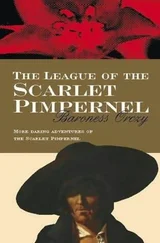Emmuska Orczy - Petticoat Rule
Здесь есть возможность читать онлайн «Emmuska Orczy - Petticoat Rule» — ознакомительный отрывок электронной книги совершенно бесплатно, а после прочтения отрывка купить полную версию. В некоторых случаях можно слушать аудио, скачать через торрент в формате fb2 и присутствует краткое содержание. Жанр: foreign_language, foreign_prose, Зарубежные любовные романы, на английском языке. Описание произведения, (предисловие) а так же отзывы посетителей доступны на портале библиотеки ЛибКат.
- Название:Petticoat Rule
- Автор:
- Жанр:
- Год:неизвестен
- ISBN:нет данных
- Рейтинг книги:4 / 5. Голосов: 1
-
Избранное:Добавить в избранное
- Отзывы:
-
Ваша оценка:
- 80
- 1
- 2
- 3
- 4
- 5
Petticoat Rule: краткое содержание, описание и аннотация
Предлагаем к чтению аннотацию, описание, краткое содержание или предисловие (зависит от того, что написал сам автор книги «Petticoat Rule»). Если вы не нашли необходимую информацию о книге — напишите в комментариях, мы постараемся отыскать её.
Petticoat Rule — читать онлайн ознакомительный отрывок
Ниже представлен текст книги, разбитый по страницам. Система сохранения места последней прочитанной страницы, позволяет с удобством читать онлайн бесплатно книгу «Petticoat Rule», без необходимости каждый раз заново искать на чём Вы остановились. Поставьте закладку, и сможете в любой момент перейти на страницу, на которой закончили чтение.
Интервал:
Закладка:
Elegant too, always immaculately, nay daintily dressed, he wore with that somewhat stiff grace peculiar to the English gentleman the showy and effeminate costume of the time. But there was weakness expressed in his very attitude as he stood now talking to Charles Edward Stuart: the kindly, pleasant expression of his good-looking face in strange contrast to the glowering moodiness of his princely friend.
One Lord Eglinton had followed the deposed James II into exile. His son had risked life and fortune for the restoration of the old Pretender, and having managed by sheer good luck to save both, he felt that he had done more than enough for a cause which he knew was doomed to disaster. But he hated the thought of a German monarch in England, and in his turn preferred exile to serving a foreigner for whom he had scant sympathy.
Immensely wealthy, a brilliant conversationalist, a perfect gentleman, he soon won the heart of one of the daughters of France. Mlle. de Maille brought him, in addition to her own elaborate trousseau and a dowry of three thousand francs yearly pin-money, the historic and gorgeous chateau of Beaufort which Lord Eglinton's fortune rescued from the hands of the bailiffs.
Vaguely he thought that some day he would return to his own ancestral home in Sussex, when England would have become English once again; in the meanwhile he was content to drift on the placid waters of life, his luxurious craft guided by the domineering hand of his wife. Independent owing to his nationality and his wealth, a friend alike of the King of France and the Stuart Pretender, he neither took up arms in any cause, nor sides in any political intrigue.
Lady Eglinton brought up her son in affluence and luxury, but detached from all partisanship. Her strong personality imposed something of her own national characteristics on the boy, but she could not break the friendship that existed between the royal Stuarts and her husband's family. Although Charles Edward was her son's playmate in the gardens and castle of Beaufort, she nevertheless succeeded in instilling into the latter a slight measure of disdain for the hazardous attempts at snatching the English crown which invariably resulted in the betrayal of friends, the wholesale slaughter of adherents, and the ignominious flight of the Pretender.
No doubt it was this dual nationality in the present Lord Eglinton, this detachment from political conflicts, that was the real cause of that inherent weakness of character which Mme. de Pompadour now wished to use for her own ends. She was glad, therefore, to note that whilst Charles Edward talked earnestly to him, the eyes of "le petit Anglais" roamed restlessly about the room, as if seeking for support in an argument, or help from a personality stronger than his own.
Lady Eglinton's voice, harsh and domineering, often rose above the general hum of talk. Just now she had succeeded in engaging the Prime Minister in serious conversation.
The King in the meanwhile had quietly dropped asleep, lulled by the even ripple of talk of the beautiful Marquise and the heavily scented atmosphere of the room. Pompadour rose from her chair as noiselessly as her stiff brocaded skirt would allow; she crossed the room and joined Lady Eglinton and M. le Duc d'Aumont.
She was going to take King Louis's advice and add the weighty influence of her own bright eyes to that of my lady's voluble talk in favour of the appointment of Lord Eglinton to the newly created Ministry of Finance.
CHAPTER IV
A WOMAN'S SURRENDER
In a small alcove, which was raised above the level of the rest of the floor by a couple of steps and divided from the main banqueting hall by a heavy damask curtain now partially drawn aside, Mlle. d'Aumont sat in close conversation with M. le Comte de Stainville.
From this secluded spot these two dominated the entire length and breadth of the room; the dazzling scene was displayed before them in a gorgeous kaleidoscope of moving figures, in an ever-developing panorama of vividly coloured groups, that came and went, divided and reunited; now forming soft harmonies of delicate tones that suggested the subtle blending on the palette of a master, anon throwing on to the canvas daring patches of rich magentas or deep purples, that set off with cunning artfulness the masses of pale primrose and gold.
Gaston de Stainville, however, did not seem impressed with the picturesqueness of the scene. He sat with his broad back turned toward the brilliant company, one elbow propped on a small table beside him, his hand shielding his face against the glare of the candles. But Lydie d'Aumont's searching eyes roamed ceaselessly over the gaily plumaged birds that fluttered uninterruptedly before her gaze.
With one delicate hand holding back the rich damask curtain, the other lying idly in her lap, her white brocaded gown standing out in stiff folds round her girlish figure, she was a picture well worth looking at.
Lydie was scarcely twenty-one then, but already there was a certain something in the poise of her head, in every movement of her graceful body, that suggested the woman accustomed to dominate, the woman of thought and action, rather than of sentiment and tender emotions.
Those of her own sex said at that time that in Lydie's haughty eyes there was the look of the girl who has been deprived early in life of a mother's gentle influence, and who has never felt the gentle yet firm curb of a mother's authority on her childish whims and caprices.
M. le Duc d'Aumont, who had lost his young wife after five years of an exceptionally happy married life, had lavished all the affection of his mature years on the girl, who was the sole representative of his name. The child had always been headstrong and self-willed from the cradle; her nurses could not cope with her babyish tempers; her governesses dreaded her domineering ways. M. le Duc was deaf to all complaints; he would not have the child thwarted, and as she grew up lovable in the main, she found her father's subordinates ready enough to bend to her yoke.
From the age of ten she had been the acknowledged queen of all her playmates, and the autocrat of her father's house. Little by little she obtained an extraordinary ascendancy over the fond parent, who admired almost as much as he loved her.
He was deeply touched when, scarce out of the school room, she tried to help him in the composition of his letters, and more than astonished to see how quick was her intelligence and how sharp her intuition. Instinctively, at first he took to explaining to her the various political questions of the day, listening with paternal good-humour, to her acute and sensitive remarks on several important questions.
Then gradually his confidence in her widened. Many chroniclers aver that it was Lydie d'Aumont who wrote her father's celebrated memoirs, and those who at that time had the privilege of knowing her intimately could easily trace her influence in most of her father's political moves. There is no doubt that the Duc himself, when he finally became Prime Minister of France, did very little without consulting his daughter, and even l'Abbé d'Alivet, in his "Chroniques de Louis XV," admits that the hot partisanship of France for the Young Pretender's ill-conceived expeditions was mainly due to Mlle. d'Aumont's influence.
When Vanloo painted her a little later on, he rendered with consummate and delicate skill the haughty look of command which many of Lydie's most ardent admirers felt to be a blemish on the exquisite purity and charm of her face.
The artist, too, emphasized the depth and earnestness of her dark eyes, and that somewhat too severe and self-reliant expression which marked the straight young brow.
Perhaps it was this same masterful trait in the dainty form before him that Gaston de Stainville studied so attentively just now; there had been silence for some time between the elegant cavalier and the idolized daughter of the Prime Minister of France. She seemed restless and anxious, even absent-minded, when he spoke. She was studying the various groups of men and women as they passed, frowning when she looked on some faces, smiling abstractedly when she encountered a pair of friendly eyes.
Читать дальшеИнтервал:
Закладка:
Похожие книги на «Petticoat Rule»
Представляем Вашему вниманию похожие книги на «Petticoat Rule» списком для выбора. Мы отобрали схожую по названию и смыслу литературу в надежде предоставить читателям больше вариантов отыскать новые, интересные, ещё непрочитанные произведения.
Обсуждение, отзывы о книге «Petticoat Rule» и просто собственные мнения читателей. Оставьте ваши комментарии, напишите, что Вы думаете о произведении, его смысле или главных героях. Укажите что конкретно понравилось, а что нет, и почему Вы так считаете.












